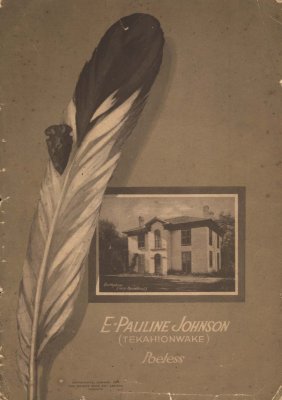E. PAULINE JOHNSON (Tekahionwake) was the youngest of four children, born to the late G.H.M. Johnson (Onwanonsyshon), Chief of the Six Nations Indians, and his wife. Emily S. Howells. Her father, Chief Johnson, was a Mohawk Indian of the "Blood Royal." He was a direct descendant of one of the five Chiefs whose tribes composed the historical confederation founded by Hiawatha four hundred years ago, and known as the Brotherhood of Five Nations, afterwards named Iroquois by the early French Missionaries and Explorers. Her Grandfather, who attained special glory for his deeds of valor while fighting alongside of his British Allies, was known in times of peace as the "The Mohawk Warbler," on account of his command of language, which he used with impassioned and dramatic eloquence.
Her Mother, Emily S. Howells, was a lady of pure English parentage, and a family who possessed distinct literary tendencies and habits, of whom W.D. Howells, the American Novelist, Poet and Essayist, is perhaps the best known.
While no writer in Canada could lay greater claim to being a Canadian than this native-born woman, it was inevitable that the loyalty to Britain and Britain's flag, which she inherited from her red ancestors and her English Mother, should dominate her prose and poetic writings.
Pauline Johnson was a poetess when in her mother's arms. To think and write in poetic terms was hers by instinct, and her talents developed as she grew older.
Her education was limited to two years under a governess, three years at an Indian School, and two years in the Brantford Public School.
She was an exhaustive reader even as a child, and had read and re-read Scott, Longfellow, much of Shakespeare and Byron, and many of the best books of the day before she was twelve years old.
The late Professor Goldwin Smith was among the very first to appreciate her talent, and published in "The Week" many of her earliest poems. Her name after that became a familiar one to the readers of the leading magazines and newspapers.
Her first appearance as a reader in public occurred in 1892, when she contributed to the programme of an "All Authors' Night" before the Young Mens' Liberal Club of Toronto. Her selection on that occasion was her poem 'A Cry of an Indian Wife." The impression created by her effort that night was so favorable that arrangement were made for her to give a full night's entertainment two weeks later in Massey Hall. It was for this occasion she wrote the poem by which she is best known, "The Song My Paddle Sings." The success of this entertainment resulted in her giving a series of recitals in the chief centres of Canada.
The proceeds of these recitals enabled her to go to England. While there a small edition of her early poems was published. On her return to Canada she toured the principal cities and towns from the Atlantic to the Pacific. Her dramatic fervor and strong magnetic personality roused her audiences to a pitch of enthusiastic patriotism seldom equalled by either male or female entertainer. In 1903 another small volume of her poems was published. Both of these editions have long been out of print.
For the last few years this gifted woman made her abode in Vancouver, to which place she betook herself when unable to continue the strenuous life of a public entertainer, and in hopes that the warm breezes of the Pacific and a prolonged rest would restore her again to her ordinary vigor. But the hand of disease was upon her, and her friends saw her gradually fading away.
The Members of the Woman's Canadian Club interested themselves in her welfare, and an organization of the leading citizens of Vancouver was convened and arrangements perfected to publish a complete edition of Miss Johnson's poems under the title of "Flint and Feather." In compliance with this arrangement a new illustrated edition of "Flint and Feather," containing all her poems, has just been published.
Mr. Theodore Watts-Dunton who wrote the introduction to this edition, in accepting the commission says:
"I am distressed to get such sad news of my friend Miss E. Pauline Johnson. She is a lady of whom Canada may well be proud. A fine poet and a noble-hearted woman. I shall of course deem it a privilege to write the introduction suggested."
Miss Johnson died in March last. Shortly after the doctors told her that her illness would be her final one, she wrote the poem published herewith, taking a line from Tennyson "And he said fight on" as her theme.
It seems fitting that this should be reproduced in its original form with her signature and favorite photograph gift as the years go by, for after all there will never be another who can sing the songs she sang, or so interpret the spirit of her beloved native land.
Toronto, Nov. 20. 1913.
Time, and it's ally, Dark Disarmament
Have compassed me about,
Have massed their armies, and on battle bent
My forces put to rout,
But though I fight alone, and fall, and die,
Talk terms of Peace? Not I.
They war upon my fortress, and their guns,
Are shattering its walls,
My army plays the cowards' part and runs
Pierced by a thousand balls,
They call me for my surrender, I reply
"Give quarter now? Not I."
They've shot my flag to ribbons, but in rents
It floats about the height.
Their Ensign shall not crown my battlements
While I can stand and fight.
I fling defiance at them as I cry
"Capitulate? Not I."
E.Pauline Johnson
- Tekahionwake




